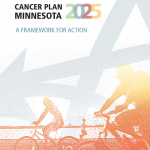Written by Emily Myatt, Minnesota Government Relations Director, American Cancer Society Cancer Action Network
The Minnesota 2020 State Legislative regular session ended on May 18, 2020. The coronavirus pandemic impacted the legislative session and process. Despite disruptions, Minnesota lawmakers passed three policies that address cancer prevention and access to care.
Cancer Prevention:
Tobacco 21
Use of tobacco products by youth remains unacceptably high with new users starting every day. Ninety-five (95) percent of adults who smoke started before the age of 21. We support raising the minimum age for sale of all tobacco products, including e-cigarettes, to age 21 with strong retailer compliance and active enforcement as part of a comprehensive strategy to reduce youth initiation.
The Minnesota Legislature passed legislation to raise Minnesota’s commercial tobacco sales age to 21 with bipartisan support, and the Governor signed the bill into law at the end of May. The bill strengthens retailer compliance, active enforcement, and removes penalties on minors for the purchase, use and possession of commercial tobacco. Tobacco 21 goes into effect on August 1, 2020. This policy wins align with Objective 11.3 of the Cancer Plan Minnesota 2025.
Access to Care
Breast and Cervical Cancer Treatment
The CDC’s NBCCDEP program helps low-income, uninsured, and under-insured women gain access to lifesaving screening programs for early detection of breast and cervical cancers. Uninsured and underinsured women have lower screening rates, resulting in a great risk of being diagnosed at a later, more advanced stage of the disease. Under federal law, any woman diagnosed with cancer through a NBCCDEP-funded program is eligible for Medicaid. Access to treatment and health care coverage is critical to surviving the disease. However, Minnesota’s Medical Assistance for Breast and Cervical Cancer Treatment Act (MABC) was written with the most restrictive wording and names the Minnesota Department of Health’s Sage Screening Program as the only pathway to treatment coverage, leaving out any women screened through other CDC NBCCDEP funded programs. For example, women diagnosed with cancer through the American Indian Cancer Foundation’s Screen Our Circle program, which is funded by the CDC’s NBCCDEP program, would not have this same treatment path option.
The Minnesota Legislature passed legislation that will decrease barriers to breast and cervical cancer treatment for more Minnesota women. The legislation broadens state law to conform with federal law and ensure that any Minnesota woman diagnosed through a CDC NBCCDEP-funded program can access Medicaid for her treatment, if she doesn’t already have qualified coverage. This law goes into effect on August 1, 2020. This policy win aligns with Objective 5 of the Cancer Plan Minnesota 2025.
Clinical Trials
Clinical trials are critical to advancing life-saving cancer treatments, and patient participation if crucial to the success of clinical trials. However, nearly 1 million Minnesotans, including children currently receiving Medicaid do not have access to these trials, which could potentially provide them with a life-saving therapy or cure for their disease. For patients on Medicare or enrolled in private insurance plans, their insurance covers the standard or routine cost of care, with the clinical trial sponsor paying for the cost of the experimental drug or treatment. However, Medicaid does not cover routine costs, creating barriers to enrolling in a clinical trial. All Minnesotans should have access to clinical trials, no matter where they live, their income, or where they get their health insurance coverage.
The Minnesota legislature passed legislation that would require Medicaid to cover routine costs incurred during a clinical trial. The law goes into effect on August 1, 2020. This policy win aligns with Objective 10.4 of the Cancer Plan Minnesota 2025.



